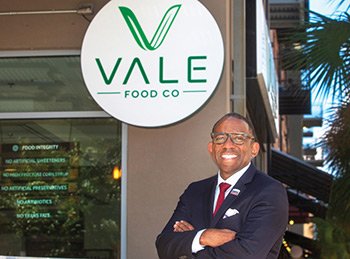
Giving local startups a considerable level up
Sunny Ilyas had no experience running a business, but he had what he confidently thought was a winning idea.
Florida State University students, he believed, would be willing to subscribe to a meal plan supplying healthy food as an alternative to on-campus fare.
For advice on how to launch his intended business, Ilyas turned to Keith Bowers, the regional director of the Small Business Development Center at FAMU.
 “I could never repay Keith for all the time and energy he invested in me,” Ilyas said. “He helped me get my business going. He taught me how to correspond with banks and prepare the kind of documents they require so I could obtain financing. He brought clarity to my business model and showed me where the opportunities and the pitfalls were.”
“I could never repay Keith for all the time and energy he invested in me,” Ilyas said. “He helped me get my business going. He taught me how to correspond with banks and prepare the kind of documents they require so I could obtain financing. He brought clarity to my business model and showed me where the opportunities and the pitfalls were.”
Bowers recalls the inception of Vale Food Co. six years ago and Ilyas’s days as a kitchen surfer.
“He didn’t have a commercial kitchen when he started,” Bowers said. “He borrowed kitchen time and equipment from restaurants who could accommodate him.”
But, as his subscription rolls grew, Ilyas recognized that he was going to require his own place. He found a location in CollegeTown and, in addition to his meal plan business, started a dine-in restaurant.
Today, Ilyas has seven locations — three in Tallahassee, plus one each in Gainesville, Jacksonville, Tampa and Fort Lauderdale — and employs a total of 150 people.
He has pivoted, he said, away from meal plans but has maintained his focus on healthy food as a restaurateur and caterer. His Tallahassee and Gainesville locations target students, while the others operate from downtown locations and focus on people seeking a fast-casual but nutritious place for lunch.
“Every time Sunny was looking to expand, we helped him analyze the market, looked at his own capacity, performed a financial analysis, and helped with projections and finding funding sources,” Bowers said.
Critically, Ilyas said, “Keith kept me from making bonehead moves and steered me toward making good ones. He was my support system.”
Bowers has been on the job at the SBDC for nine years. The agency receives funding from the state and federal governments and from FAMU in support of its efforts to supply start-ups and growth-minded enterprises with business development services.
Bowers finds that entrepreneurship has gained momentum in the Tallahassee area in recent years.
“The landscape in Tallahassee, Leon County and the region has changed and has become a lot more receptive to entrepreneurial interests,” Bower said. “And we are seeing a lot more engagement from people who want to start a business or grow a business and expand their market share.
“A lot of our (approximately 600) clients feel that now is a great time to be in business.”
Bowers noted that Tallahassee historically has been associated with public-sector activity.
“But we’ve seen a seismic shift,” he said. “There’s been a wave for the last seven years toward locally owned and supported businesses — and businesses have done a great job of leveraging the resources available. The City of Tallahassee and Leon County are focused on economic development and job growth and the private sector is a lot more nimble than the public sector. It reacts quickly to opportunities.”
Bowers pointed to Reamonn Soto, the founder of Sensatek Propulsion Technology Inc. in Daytona Beach, as an entrepreneur who took advantage of resources, some of them uniquely available in Tallahassee.
“He made the rounds,” Bowers said of Soto. “The Jim Moran Institute, the SBDC, the Entrepreneurial Excellence Program — and he worked with Innovation Park and received a Small Business Innovation Research grant.”
Sensatek has developed wireless sensors that measure firing temperatures in gas turbine engines, enabling operators to extend maintenance intervals and avoid the substantial costs associated with incidents of overheating.
“Industrial gas turbine production is expected to increase over the next 14 years, and these turbines will operate at much higher temperatures to achieve higher efficiencies, thereby being prone to more incidents that involve overheating,” Sensatek notes on its website.
Unlike alternatives, Sensatek sensors may be placed inside gas turbine engines and thus do a superior job of detecting hotspots.
In 2016, Sensatek won the $50,000 first prize in the Megawatt Ventures Competition, sponsored by the U.S. Department of Energy. Megawatt Ventures supports the commercialization and success of clean-tech innovations developed by university students. Soto attended FAMU and Embry-Riddle Aeronautical University.
“We helped Raemonn with his business model and customer discovery,” Bowers said. “His research has implications for the energy industry and large commercial operations.”
Bowers said in September that Soto was involved in a second capital raise, seeking $2 million. His research has attracted the interest of Seimens, which manufactures turbines, and aerospace giants Northrop-Grumman and Boeing.
Any entrepreneur or any small business with 100 or fewer employees and whose revenues do not exceed $20 million is eligible for SBDC services.
“We’ve worked with most industries in the Tallahassee area,” Bowers said. “We sit down with you, understand who you are as an entrepreneur and understand more about your business. Our approach is not one-size-fits-all.”
Often, MBA students at FAMU get involved. A capstone course at the School of Business and Industry tasks students with producing specific deliverables for SBDC clients.
“Students may work on market research, social media, financial analysis, campaigns, supply chains and logistics and more,” Bowers said.
“Our engagements with businesses usually last two to three years. We’re with you from conception to completion.”
Article source: 850 Business Magazine, Steve Bornhoft
